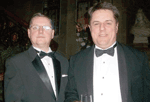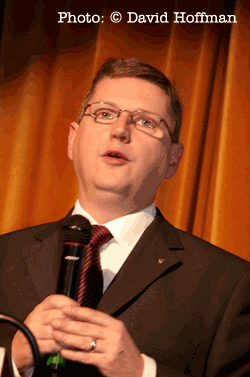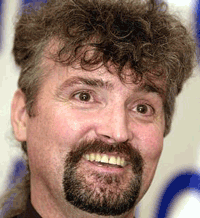• We have no difficulty with Ahmadinejad – Erdogan
• Warning to Europe not to ignore Turkey’s strengths
 With its stunning vistas and former Ottoman palaces, the banks of the Bosphorus – the strategic waterway that cuts Istanbul in half and divides Europe from Asia – may be the perfect place to distinguish friend from foe and establish where your country’s interests lie.
With its stunning vistas and former Ottoman palaces, the banks of the Bosphorus – the strategic waterway that cuts Istanbul in half and divides Europe from Asia – may be the perfect place to distinguish friend from foe and establish where your country’s interests lie.
And sitting in his grandiose headquarters beside the strait, long the symbol of Turkey‘s supposed role as bridge between east and west, Recep Tayyip Erdogan had little doubt about who was a friend and who wasn’t.
Mahmoud Ahmadinejad, Iran‘s radical president whose fiery rhetoric has made him a bête noire of the west? “There is no doubt he is our friend,” said Erdogan, Turkey’s prime minister for the last six years. “As a friend so far we have very good relations and have had no difficulty at all.”
What about Nicolas Sarkozy, president of France, who has led European opposition to Turkey’s bid to join the EU and, coincidentally, adopted a belligerent tone towards Iran’s nuclear programme? Not a friend?
“Among leaders in Europe there are those who have prejudices against Turkey, like France and Germany. Previously under Mr Chirac, we had excellent relations [with France] and he was very positive towards Turkey. But during the time of Mr Sarkozy, this is not the case. It is an unfair attitude. The European Union is violating its own rules.
“Being in the European Union we would be building bridges between the 1.5bn people of Muslim world to the non-Muslim world. They have to see this. If they ignore it, it brings weakness to the EU.”
Friendly towards a religious theocratic Iran, covetous and increasingly resentful of a secular but maddeningly dismissive Europe: it seems the perfect summary of Turkey’s east-west dichotomy.
Erdogan’s partiality towards Ahmadinejad may surprise some in the west who see Turkey as a western-oriented democracy firmly grounded inside Nato. It has been a member of the alliance since 1952. It will be less surprising to Erdogan’s secular domestic critics, who believe the prime minister’s heart lies in the east and have long suspected his Islamist-rooted Justice and Development party (AKP) government of plotting to transform Turkey into a religious state resembling Iran.
Erdogan vigorously denies the latter charge, but to his critics he and Ahmadinejad are birds of a feather: devout religious conservatives from humble backgrounds who court popular support by talking the language of the street. After Ahmadinejad’s disputed presidential election in June, Erdogan and his ally, the Turkish president, Abdullah Gul, were among the first foreign leaders to make congratulatory phone calls, ignoring the mass demonstrations and concerns of western leaders over the result’s legitimacy.
Talking to the Guardian, Erdogan called the move a “necessity of bilateral relations”. “Mr Ahmadinejad was declared to be the winner, not officially, but with a large vote difference, and since he is someone we have met before, we called to congratulate him,” he said.
“Later it was officially declared that he was elected, he got a vote of confidence and we pay special attention to something like this. It is a basic principle of our foreign policy.”
The gesture will be remembered when Erdogan arrives in Tehran this week for talks with Ahmadinejad and Ayatollah Ali Khamenei, Iran’s supreme leader, that will focus on commercial ties, including Turkey’s need for Iranian natural gas. Ahmadinejad has voiced his admiration for Erdogan, praising Turkey’s recent decision to ban Israel from a planned Nato manoeuvre in protest at last winter’s bombardment of Gaza.
Since the election, Iran has witnessed a fierce crackdown on opposition figures that has resulted in activists, students and journalists being imprisoned and publicly tried. Detainees have died in prison, and there have been allegations of torture and rape. Some of those alleging mistreatment have sought refuge in Turkey.
But Erdogan said he would not raise the post-election crackdown with his hosts, saying it would represent “interference” in Iranian domestic affairs.
He poured cold water on western accusations that Iran is seeking a nuclear weapon, saying: “Iran does not accept it is building a weapon. They are working on nuclear power for the purposes of energy only.”
Erdogan has overseen a dramatic improvement in the previously frigid relations between Turkey and Iran, which was viewed with suspicion by the pro-secularist high command of the powerful Turkish military. Trade between the two countries last year was worth an estimated £5.5bn as Iran has developed into a major market for Turkish exports.
Erdogan’s views will interest US foreign policy makers, who have long seen his AKP government as a model of a pro-western “moderate Islam” that could be adopted in other Muslim countries. They will also find an audience with President Barack Obama, who signalled Turkey’s strategic importance in a visit last April and has invited the prime minister to visit Washington. They are unlikely to impress Israel, which has warned that Erdogan’s criticisms risk harming Turkey’s relations with the US.
Erdogan dismissed the notion, saying: “I don’t think there is any possibility of that. America’s policy in this region is not dictated by Israel.”
He insisted that the Turkey-Israel strategic alliance – which some AKP insiders have said privately is over – remains alive but chided the Israeli foreign minister, Avigdor Lieberman, who he said had threatened to use nuclear weapons against Gaza.
The Guardian
 The European Union (EU) report says that racism is on the rise in Germany. The EU report on racism in Europe severely critised Germany. The criticism for Germany comes on several fronts, including violent crimes and discrimination against foreigners in the job and housing markets.
The European Union (EU) report says that racism is on the rise in Germany. The EU report on racism in Europe severely critised Germany. The criticism for Germany comes on several fronts, including violent crimes and discrimination against foreigners in the job and housing markets.






 Turkey has urged France and Germany to back its bid to join the EU, rejecting calls for a special partnership rather than full membership.
Turkey has urged France and Germany to back its bid to join the EU, rejecting calls for a special partnership rather than full membership.